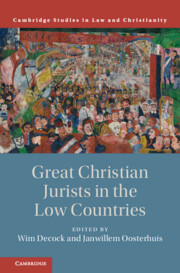Book contents
- Great Christian Jurists in the Low Countries
- Law and Christianity
- Great Christian Jurists in the Low Countries
- Copyright page
- Contents
- Contributors
- Introduction Law, Christianity, and Secularization in the Low Countries
- 1 Alger of Liège
- 2 Arnoldus Gheyloven
- 3 Boëtius Epo
- 4 Leonardus Lessius
- 5 Franciscus Zypaeus
- 6 Hugo Grotius
- 7 Paulus Voet
- 8 Ulrik Huber
- 9 Zeger-Bernard van Espen
- 10 Dionysius van der Keessel
- 11 Pieter Paulus
- 12 Guillaume Groen van Prinsterer
- 13 Edouard Ducpétiaux
- 14 Charles Périn
- 15 Léon de Lantsheere
- 16 Paul Scholten
- 17 Willem Duynstee
- 18 Jules Storme
- 19 Herman Dooyeweerd
- 20 Josse Mertens de Wilmars
- Index
- References
5 - Franciscus Zypaeus
Published online by Cambridge University Press: 16 September 2021
- Great Christian Jurists in the Low Countries
- Law and Christianity
- Great Christian Jurists in the Low Countries
- Copyright page
- Contents
- Contributors
- Introduction Law, Christianity, and Secularization in the Low Countries
- 1 Alger of Liège
- 2 Arnoldus Gheyloven
- 3 Boëtius Epo
- 4 Leonardus Lessius
- 5 Franciscus Zypaeus
- 6 Hugo Grotius
- 7 Paulus Voet
- 8 Ulrik Huber
- 9 Zeger-Bernard van Espen
- 10 Dionysius van der Keessel
- 11 Pieter Paulus
- 12 Guillaume Groen van Prinsterer
- 13 Edouard Ducpétiaux
- 14 Charles Périn
- 15 Léon de Lantsheere
- 16 Paul Scholten
- 17 Willem Duynstee
- 18 Jules Storme
- 19 Herman Dooyeweerd
- 20 Josse Mertens de Wilmars
- Index
- References
Summary
François vanden Zype (or in Latin: Franciscus Zypaeus) was born in Mechelen in 1580. A son of Henri vanden Zype and Claire du Carne, he grew up in a devout Catholic aristocratic family. His father was lord of Kauwendael (near Mechelen) and Audermeulen (near Berlaar). In the roaring times of the 1580s, when Catholic liturgical celebrations were prohibited in Mechelen, Henri and Claire had been forced to travel to Antwerp to get François baptized in the Catholic Church. François’s parents succeeded in transferring their faith to their offspring. Out of eight children, no less than four chose an ecclesiastical career. Franciscus’s brothers Henri and Philippe entered the Benedictine order. The latter was a religious in the abbey of Saint John in Ypres; the former even became abbot of the Saint Andrew monastery in Bruges and was known for his theological books. Franciscus himself and his brother Rombaut opted for the secular clergy, and both were promoted to the canonicate. Another brother, Pierre, became bailiff of the margraveship of Lede.
- Type
- Chapter
- Information
- Great Christian Jurists in the Low Countries , pp. 80 - 96Publisher: Cambridge University PressPrint publication year: 2021



